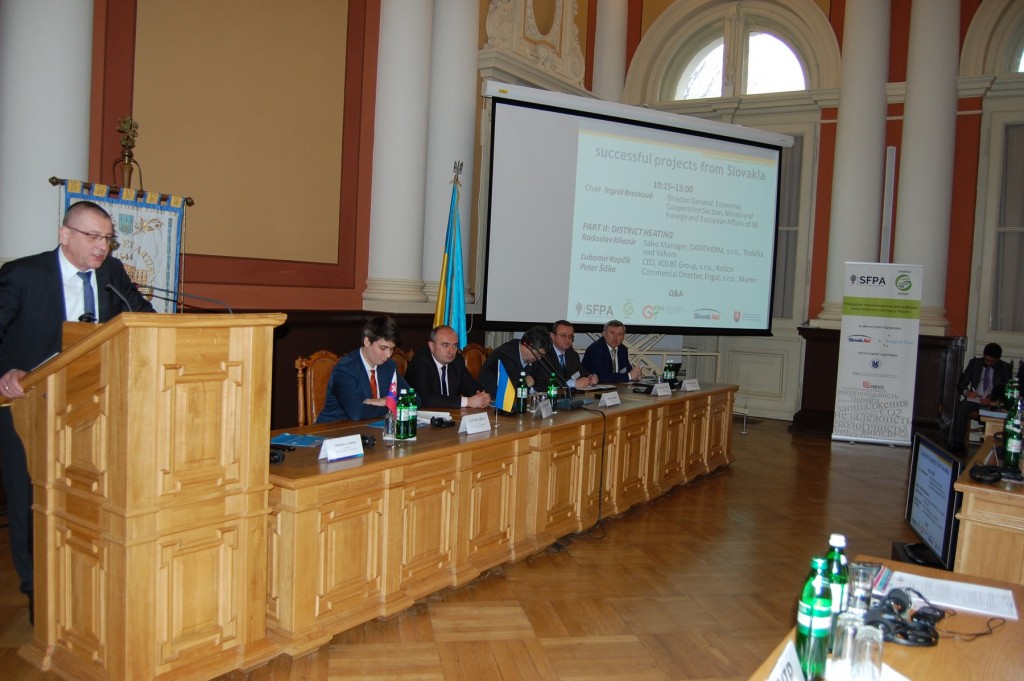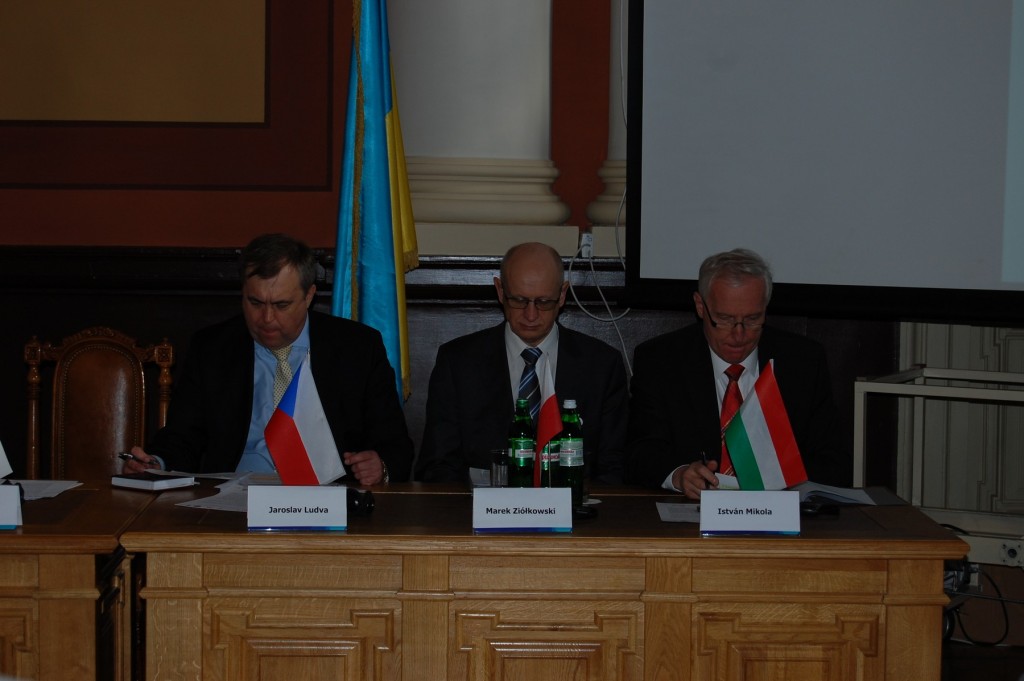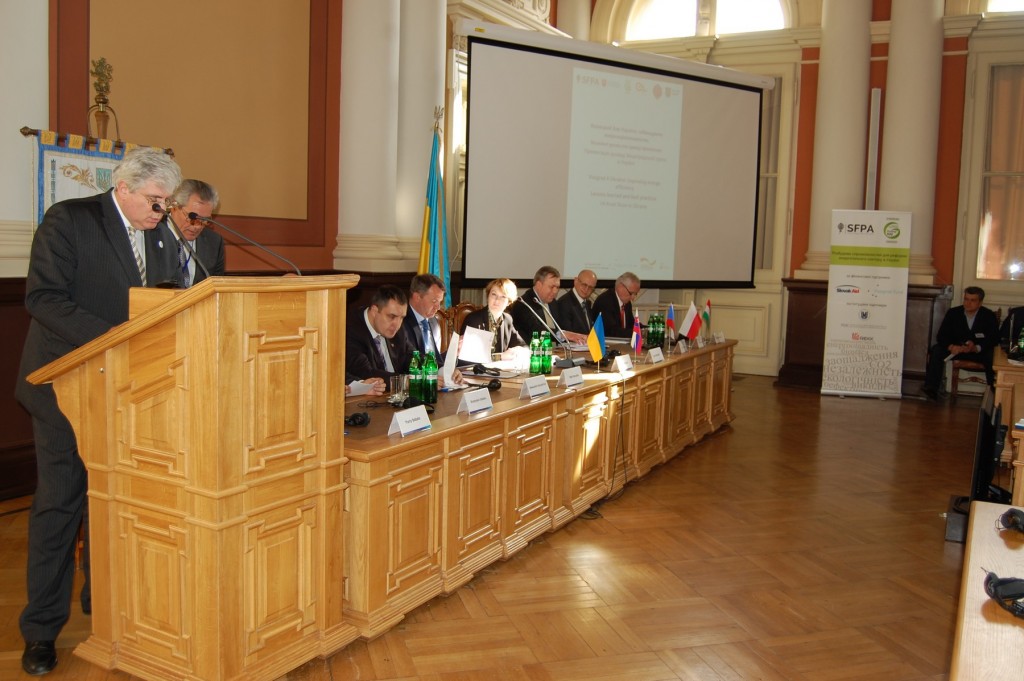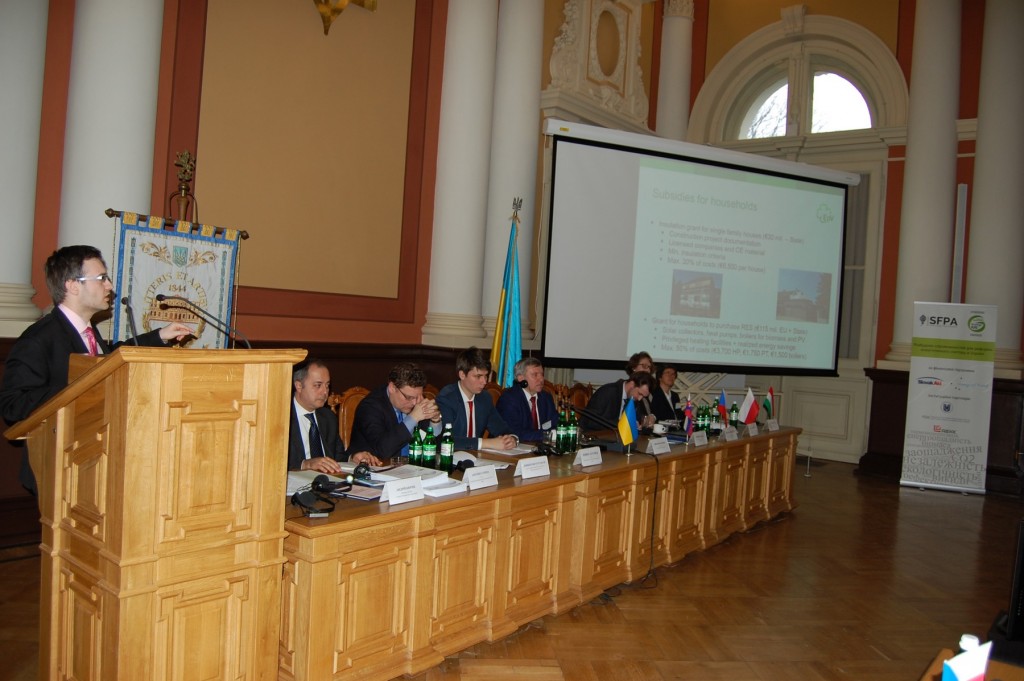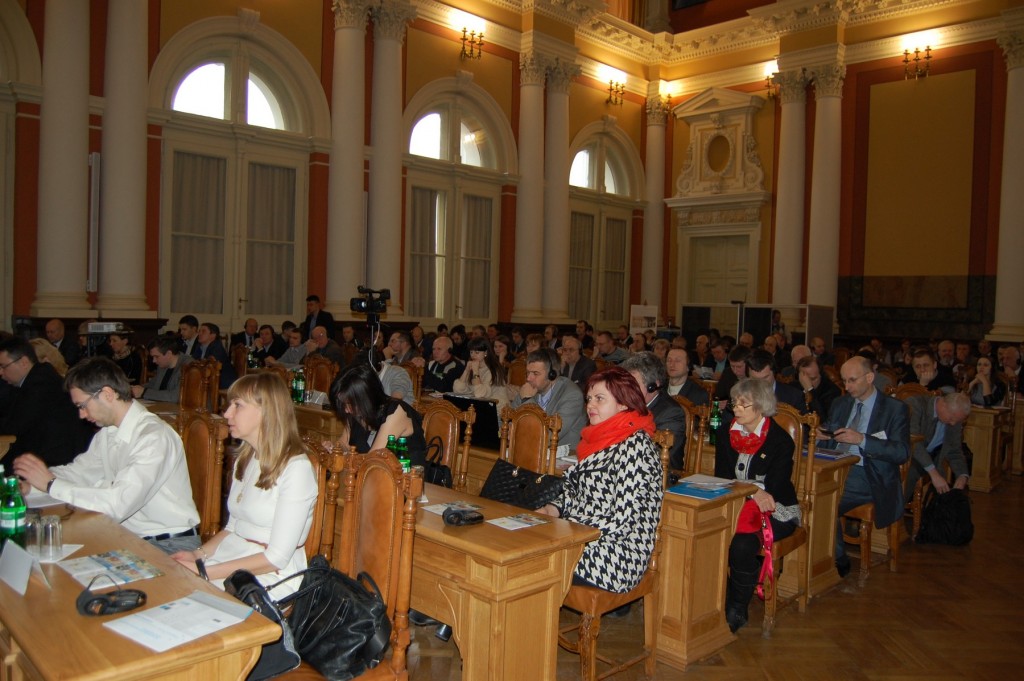Visegrad 4 Ukraine: improving energy efficiency
25. februára 2016 - Lviv Polytechnic National University, 12 Bandera Street, Lviv
Date: February 25, 2016
Venue: Lviv Polytechnic National University, 12 Bandera Street, Lviv
Organizer: The Ministry of Foreign and European Affairs of the Slovak Republic in cooperation with the Ministry of Foreign Affairs of the Czech Republic, the Ministry of Foreign Affairs and Trade of Hungary, the Ministry of Foreign Affairs of Poland, the Ministry of Foreign Affairs of Ukraine and the Slovak Foreign Policy Association
Partners: International Visegrad Fund, Lviv City Council, Lviv Oblast State Administration, Deutsche Gesellschaft für Internationale Zusammenarbeit (GIZ) GmbH, Centre for Global Studies: Strategy XXI (Kyiv), Faculty of Social Sciences, Masaryk University (Brno), Polish Institute of International Affairs (Warsaw), Association of Energy Efficient Cities in Ukraine, Lviv and SlovakAid
Languages: English and Ukrainian (with simultaneous translation)
Goal: This roundtable is part of the “V4 Road Show in Ukraine” initiative agreed by the V4 deputy foreign ministers in Lviv on October 7, 2014, where the aim is, first, for V4 countries to share their reform experiences of selected policy areas with Ukraine, and second, to enhance coordination of V4 assistance to Ukraine. The V4 countries agreed to take on sector-specific roles in providing assistance to Ukraine in relation to the reform process linked to implementation of the Association Agreement with the EU. Slovakia is in charge of energy. The aim of the Lviv roundtable, to be held under the auspices of Slovak Deputy Foreign and European Affairs Minister Igor Slobodník, is to facilitate the sharing of V4 experiences with Ukrainian partners on improving energy efficiency and the use of renewables, including implementation of the EU legislation and programs, transposition into the national legislation and V4 country policies, and learning from best practices and successfully energy efficiency projects in the V4 countries.
es as well as learning from the best practices and successfully implemented projects in the field of energy efficiency in the V4 countries.
Warning: Invalid argument supplied for foreach() in /data/7/9/795d260e-a882-4303-97db-7ccfaba621b2/sfpa.sk/sub/archiv/wp-content/themes/twentyfourteen/single-event.php on line 70
On February 25, 2016, an international roundtable was organized in the city of Lviv as part of the “V4 Road Show in Ukraine”. It was titled “Visegrad 4 Ukraine: improving energy efficiency – Lessons learned and best practices” and was organized by the Ministry of Foreign and European Affairs of the Slovak Republic in cooperation with the Ministry of Foreign Affairs of the Czech Republic, the Ministry of Foreign Affairs and Trade of Hungary, the Ministry of Foreign Affairs of Poland, the Ministry of Foreign Affairs of Ukraine and the Slovak Foreign Policy Association.
The main partners of the event were the Centre for Global Studies: Strategy XXI (Kyiv), Lviv City Council, Lviv Region State Administration, Faculty of Social Sciences at Masaryk University (Brno), the Polish Institute of International Affairs (Warsaw), the Regional Centre for Energy Policy Research (Budapest) and the Association of Energy Efficient Cities in Ukraine, Lviv.
The event was funded by the International Visegrad Fund and Deutsche Gesellschaft für Internationale Zusammenarbeit (GIZ) GmbH.
The roundtable brought together leading foreign ministry officials from the Visegrad countries and Ukraine to discuss ongoing cooperation and future steps. Igor Slobodník, state secretary of the Ministry of Foreign and European Affairs of the Slovak Republic, gave an opening statement emphasizing that cooperation between V4 countries and Ukraine, particularly in energy efficiency, is one way Ukraine can deal with the threat coming from the East (Russia), fight corruption and make headway towards social sustainability. The International Visegrad Fund and SlovakAid presented different opportunities for supporting research and know-how transfers and for sharing V4 experiences, in particular Slovakia’s in approximating and implementing EU legislation. All the V4 countries share Ukraine’s position that Nord Stream II should not be implemented as it clearly violates the EU position on fully supporting Ukraine.
Head of Lviv Polytechnic National University, Yuriy Bobalo, officially welcomed the panelists and delegates stating that the university had been helping enhance energy efficiency through applied policy research and science.
Oleh Sinuytka, head of Lviv Region State Administration, welcomed delegates to the conference and explained the opportunities available to partners abroad from the energy sector and energy efficiency and renewables, with Lviv Region ready to become a pilot region for V4 investment and projects.
Oleksandr Hanushchyn, head of Lviv Regional Council, spoke about the leading role Lviv Oblast has adopted in trans-border cooperation and called for further cooperation.
Jaroslav Ludva, Junior Deputy Minister of Foreign Affairs of the Czech Republic, discussed the post-independence period and focused on the current demand for reform, from Ukrainian citizens who defended their right to freedom and to an EU future at Euromaidan, and from the international community which hopes Ukraine will join the respected and prosperous countries of Europe.
The Czech Republic started implementing the EU energy acquis when its economy was highly energy intensive. The prospects of joining the EU and the structural funds helped it reduce its energy consumption; however, much was achieved by domestic legislative efforts and implementing EU requirements. Making use of EU experiences of change – rather than waiting for funds and grants – should become a key element in Ukraine’s reform strategy.
István Mikola, Minister of State for Security Policy and International Cooperation at the Hungarian Ministry of Foreign Affairs and Trade, stressed his country’s support for Ukrainian sovereignty and territorial integrity. Hungary will focus attention on developing Ukraine’s economic capacities with its series of seminars for Ukraine’s medium and small enterprises. Hungary backs cooperation with Ukraine in the gas sector and strictly opposes the development of further gas projects in the Baltic Sea. Hungary can share its expertise with Ukraine in renovating public buildings and housing, installing metered heat and hot water supply systems.
Marek Ziółkowski, Under-Secretary of State for Eastern Policy and Security at the Polish Ministry of Foreign Affairs, emphasized that Ukraine is making a historical choice and that the V4 is determined to support Kyiv in its reforms. Decentralizing reform has become a key priority for Poland as it helps Ukraine with its EU ambitions. At the same time, Poland also has wide-ranging experience of reducing energy consumption whilst increasing economic output and GDP. The Polish experience of using local fuels and energy potential could also prove useful to Ukrainian local authorities seeking to meet demand and strengthen energy security.
Olena Zerkal, Deputy Minister of Foreign Affairs of Ukraine for European Integration, expressed her gratitude to colleagues and participants. She stated that Ukraine had been introducing reforms under extremely difficult conditions including external aggression and loss of territory, economic assets and labor capacity. With moderate financial support from abroad and despite internal controversies and a high level of corruption fueled by influential groups, Ukraine is committed to continuing its reforms and progress. V4 countries are among those who have maintained the most consistent position in supporting Ukraine, and in the near future progress will become more evident.
The panel was followed by questions on metered energy in homes, gas price calculations, the development of Nord Stream II, national energy efficiency plans, energy savings, national targets to reduce energy consumption etc.
The first panel ended with state secretaries giving a press conference to the Ukrainian media.
During the second panel session, V4 experts shared their knowledge and experience. The chair of the panel, Mykhailo Gonchar, launched the session with a short overview of developments in the energy market and then highlighted the SFPA’s role in setting up the event to express solidarity with Ukraine, before going on to stress Ukraine’s European origins, role and future. The aim of the roundtable was to change the approach for dealing with energy challenges to a bottom-up one – from the community and municipality level to the district and regional level ending with the national level.
Kostiantyn Gura, from the SAEE, discussed the state agency’s position on energy efficiency in Ukraine. One SAEE priority is to replace natural gas with local fuels and renewables. The Ukrainian National Plan for Renewables commits the country to an 11 per cent renewable share of final consumption by 2020. The SAEE has developed several programs with projects and calculation the required investment, which are open to the international business sector. Conditions are good in Ukraine for the establishment of energy plants and for developing wind and solar generation. Some import restrictions on equipment have been removed and the internal market is open to international energy technologies and know-how. The legislative basis has been improved in relation to condominiums, ESCOs and metering but further steps are required before consumers can install modern regulating and metering equipment. An energy efficiency fund could be a reliable solution that would facilitate foreign investment and make affordable loans available to domestic borrowers.
Lukáš Lehotský from Masaryk University, Brno, highlighted some of the differences in the goals being pursued by Ukraine and the Czech Republic. While the latter are aiming for greater competitiveness through energy efficiency measures, the former is primarily concerned with the energy security perspective. Energy intensity in post-communist Europe is still higher than in western Europe, even when accounting for the significant progress made. The 2012/27/EU energy efficiency directive sets out the energy saving policy of the EU and signatories of the Energy Community until 2020, which contains provisions aimed at achieving a consistent gradual decrease in final energy consumption every year.
According to Lukáš Lehotský, the Czech Republic created its own energy efficiency program that ensures a moderate price increase for end users to achieve the necessary energy saving measures, government oversight and the use of European funds. During the implementation period, some lessons were learned, such as the need to ensure that the appropriate funding is available and accessible within the timeframe laid out for energy efficiency programs.
Jozef Badida, energy analyst from EpV.sk (Bratislava) encouraged delegates to learn from Slovakia’s mistakes and not to repeat them when implementing similar measures in Ukraine. One of the most challenging sectors in Slovakia has been heating. Apartment buildings were fully modernized and metered and different prices set in line with corrective factors for different parts of the building: south- or north-facing areas, middle or corner flats. To finance energy efficiency in buildings, Slovakia set up the State Housing Development Fund with a budget of 233 million euros, with 0–3 per cent interest rates, and designed to cover up to 75 per cent of costs. Slovakia also introduced energy audits but many private homeowners do not check the quality of any renovations undertaken. Since 2015 two additional state programs have been made available to householders for insulating buildings and installing RES. Energy saving measures should be implemented first with RES being installed later to further reduce energy consumption. Slovakia also made it possible for householders to be disconnected from external district heating supplies and to install private boilers. The state has amended the legislation to protect external district heating supplies since there is significant potential for savings to be made and local sources to be used flexibly. Energy performance contracting is providing new opportunities for the state to save money through the introduction of schemes to modernize public buildings and property.
Zsuzsanna Pató, analyst with the Regional Centre for Energy Policy Research in Budapest, explained that Hungarian successes in the energy efficiency sphere are closely linked to EU support and framework documents. Each EU member state has to implement a set of measures to achieve the 2020 goals on energy saving and energy consumption. Hungary uses the EU legislation framework to set national targets and develop national action plans. It has achieved moderate success in using EU funds for energy efficiency and discussions are ongoing on how to incentivize end users to implement energy efficiency measures. Hungary faces a similar problem as Ukraine in that attitudes to loans are generally hostile because of the volatile economic situation and high interest rates. Therefore the government is considering providing grants instead of loans. Zsuzsanna Pató suggested that discussions should be held on introducing energy efficiency and renewables measures whilst renovating the housing stock at the same time. This and the introduction of metering and regulation led to Hungary’s average heat consumption per flat falling from 33 GJ to 16 GJ a year.
Zuzanna Nowak, from the Polish Institute of International Affairs in Warsaw, made a few broad recommendations on energy efficiency based on the Polish experience and global trends. In the past, Poland faced the dilemma of trying to achieve lower energy consumption whilst maintaining and increasing economic output. Targets were set and a comprehensive approach was adopted in relation to the economic benefits and Poland’s weak points, for instance a dependency on coal-generated electricity, while aiming to achieve its obligations with regard to climate protection. Ukraine should develop its own energy efficiency policy, given its strong position, the prospect of economic development, its long-term goals and the fact that it is making changes to the legislation and regulations. Ukraine has the opportunity to attract significant financial support from international actors – providing it uses it effectively and transparently – and a wide number of potential energy consumers.
Krzysztof Gierulski, from the EC Support Group for Ukraine, Energy and Environment, commented on various EU experiences, in particular those of V4 countries, that could be worth extending to Ukraine. Decentralization would shift more responsibilities and greater accountability to the local level. Ensuring a stable legal environment is a condition to Ukraine gaining access to international funds, both public and private. However, in 2015 the ESCO law was the only law passed by parliament, and other draft laws are still being considered by the ministries and parliamentary committees. Together these should create the framework for local authorities to conduct their work. The energy efficiency fund draft has been presented to the Ukrainian Cabinet of Ministers and would seem to be one of few opportunities for implementing energy efficiency measures.
Antonio Somma, head of the OECD Eurasia Competitiveness Program, made several points about energy efficiency in Ukraine. Since Ukrainian energy consumption is three times that of average OECD energy consumption per $1000 GDP, it is essential that Ukraine implements energy efficiency measures. The OECD supports the involvement of ESCOs in Ukraine in modernizing homes, which need promoting, access to affordable investment and security of invested money.
Igor Slobodník made the concluding remarks. He stressed that V4 has given Ukraine strong political support and has proved ready to share experiences, best practices and lessons learned. Ukraine has to start its reforms despite the war and loss of part of its territory, as this will be the subject of reunification in the future. The EU and V4 are ready to provide the financial and technical support for the energy efficiency reforms to continue.
Uskutočnené podujatia
Slovenská spoločnosť pre záhraničnú politiku
